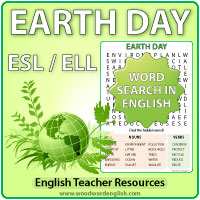Earth Day
Learn English Vocabulary
Earth Day is celebrated every year on April 22 to create awareness about the Earth’s natural environment. On this day, events are held around the world to show support for environmental protection and making our planet a better place to live in.
You can help our planet by:
- recycling instead of throwing things out
- conserving water such as not leaving the water running while you are brushing your teeth
- not wasting electricity (turn off lights and appliances that you are not using)
- taking public transport instead of driving a car
- using your own cloth bags instead of plastic bags at a supermarket
- planting a tree
- using a clothesline instead of a dryer
We must remember the 3 Rs rule:
- Reduce: to use something less
- Reuse: to use something more than once
- Recycle: to convert or reprocess materials so that they can be used again
Remember, you should help the environment EVERY day, not just once a year. Our future generations will appreciate it.
What are at least 5 things that you will do for Earth Day?
English Vocabulary
Carpool: an arrangement between people to make a regular trip in a single vehicle instead of each person in their own vehicle. Typically each person takes turns to drive the others on different days.
Climate: the weather conditions in an area.
Compost: decaying organic material used as a plant fertilizer.
Conserve: to use something as little as possible instead of continuously; to prevent something from being changed or destroyed.
Deforestation: the action of clearing a wide area of trees.
Earth: The name of our planet. The third planet from the sun.
Ecosystem: the natural organisms, flora, and fauna that constitute and sustain a particular area.
Emissions: the production and discharge of gases into the atmosphere, especially from factories or machines (such as cars and trucks).
Environment: the natural world as a whole; the surroundings or conditions in which a person, animal, or plant lives.
Fossil Fuels: fuel such as coal and oil that is formed naturally over many years from the remains of animals and plants.
Global warming: an increase in the temperature of the Earth’s atmosphere, which is due to the greenhouse effect.
Greenhouse effect: the trapping of the sun’s heat in the atmosphere caused by greenhouse gases
Greenhouse gases: any gas, especially carbon dioxide, which contributes to the greenhouse effect by absorbing infrared radiation.
Litter: trash that is left lying in an open or public place.
Nature: the physical world collectively, including plants, animals, the landscape, and other features of the planet Earth that are not human creations.
Plastic: a synthetic material that take a very long time to degrade.
Pollution: a substance that is harmful or has poisonous effects on the environment.
Preserve: to not develop or change something so as to maintain it in its existing state.
Recycle: to convert or reprocess materials so that they can be used again
Renewable: not depleted when used.
Reuse: to use something again more than once
Solar power: harnessing of the Sun’s energy to generate electrical power.
Sustainability: maintaining an ecological balance by avoiding the depletion of natural resources.
Trees: a large woody plant of considerable height and branches. Trees produce the oxygen that we need.
Waste: material that is not wanted; the unusable remains or byproduct of something
Next Activity
See our page with English vocabulary about the Environment.
Teacher / Parent Resource

If you found this English Vocabulary about Earth Day interesting or useful, let others know about it.
